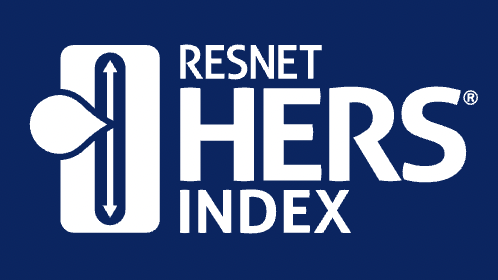
Record-Low HERS Index Score Attained with Net-Zero Insulated Concrete Form (ICF) Home

With energy prices soaring, homeowners are looking for more sustainable solutions for their homes. The HERS Index provides a quick and easy way to compare the energy-efficiency levels of different homes. By using better materials and building methods, including using ICF blocks from Fox Blocks, record-low HERS Index scores have just been set.

What is the HERS Index?

The Home Energy Rating System (HERS) Index is an industry standard used to measure a home’s energy efficiency. The HERS Index gives a numerical value to how efficiently your home uses energy and, more importantly, which modifications can lead to even greater efficiencies. Selling a home that has a low HERS Index can also command a higher price due to the greater value it will bring to the future homeowners.
How the HERS Index Works
A home’s HERS Index rating is determined by a certified Home Energy Rater, that will assess how well the home uses energy relative to some references. The lower the score, the more energy-efficient the home is. A home that scores a zero on the HERS Index scale is a net-zero home and requires no external source of energy from the local power grid. A house that scores a 100 on the HERS Index is equivalent to a typical home built to 2006 energy efficiency standards.
During an energy rating, the Home Energy Rater looks at many of the components from the home that use energy or can waste energy. Some of these components include:
HVAC systems and thermostats
Water heating systems
Exterior walls and continuous insulation
Floors over unconditioned spaces like garages or basements
Windows and doors
Vents and ductwork
Ceilings and roofs
Attics, foundations, and crawl spaces
Air infiltration
Net-Zero Homes Explained
A net-zero home scores a zero on the HERS Index. Homes with this rating use less energy than the home generates from renewable sources like solar panels. Net-zero homes are usually incredibly energy-efficient in addition to being able to generate their own power. Some of the benefits of being incredibly energy-efficient include improved health, lower costs, and greater sustainability.
A net-zero ready home is a home built to these high standards and ready for the installation of of renewable power source such as solar panels in the future.
Improved Health
Homes with high levels of energy efficiency have reduced temperature and humidity level fluctuations. The tightly sealed nature of these homes means the conditions inside are less affected by the conditions outside. Tightly controlled humidity levels also help minimize the risk of mold and mildew formation, to help keep the occupants healthy.
Lower Costs
Net-zero homes are great for homeowners because they minimize the impact of rising energy costs. Since the home is self-sustaining, fluctuations in energy bills are no longer a concern. Net-zero homes are also typically built to higher levels of quality which leads to lower maintenance costs for the homeowner over time.
Greater Sustainability
The materials used in the construction of net-zero energy homes are often higher quality and sustainably sourced. In addition to generating less carbon emissions and greenhouse gases during construction, they do not use energy from non-renewable sources. This focus on sustainability results in a very small carbon footprint for net-zero homes.
ICF Blocks from Fox Blocks: The Best Choice for Net-Zero
Getting a home to net-zero energy requires using high-grade materials and construction practices. Insulated concrete forms (ICF) are some of the best options available for building net-zero homes. ICF blocks consist of two sheets of insulation that are held together by a proprietary tie system. These blocks are lightweight and can be easily assembled on-site.

Once the blocks are assembled into the desired shape of the home’s walls, rebar is added into the space left between the blocks. With rebar installed, concrete is poured on-site and allowed to set. The final structure is an incredibly strong, steel-reinforced concrete structure with built in exterior and interior layers of continuous insulation. Five of the biggest reasons why ICF blocks are chosen for net-zero homes include:
Built-in high level of continuous insulation
Full thermal break
High thermal mass
Continuous air tightness
Structural strength to support solar panels
The concrete is poured on-site, so there are no gaps left in the wall structure where air can seep in or leak out. Traditional wall building methods provide opportunities for human error that can leave continuous insulation less effective.

Thermal bridges are formed from conductors like nails or screws that pass from the inside of the home to the outside, and provide an easy path for heat to transfer. With ICF blocks, thermal bridges are naturally avoided due to the unique construction method. By providing a full thermal break, ICF blocks can have an R-value of over 22.
The overall energy performance of an ICF home will influence the design requirements for renewable energy by reducing the number of solar panels.
Another big benefit of ICF block construction is the high thermal mass that the blocks provide. The insulation warms and cools very slowly. This thermal mass helps to dampen temperature swings, to keep the conditions in the home very consistent. All of these benefits result in a highly energy-efficient and sustainable home.
The National average for HERS rated homes is in the HERS 50+ range. A Fox Blocks home with quality windows and good roof insulation should easily be evaluated with a HERS rating well below this National average.
In fact, the record low HERS Index home was built using Fox Blocks and scored a -22 on the HERS Index. In addition to being incredibly energy-efficient, ICF block homes are also strong enough to be rated as a storm shelter.
When thinking about building a net-zero home, ICF blocks should be at the top of the list. To learn more about how ICF construction can work for your home, reach out to our net-zero home experts today.